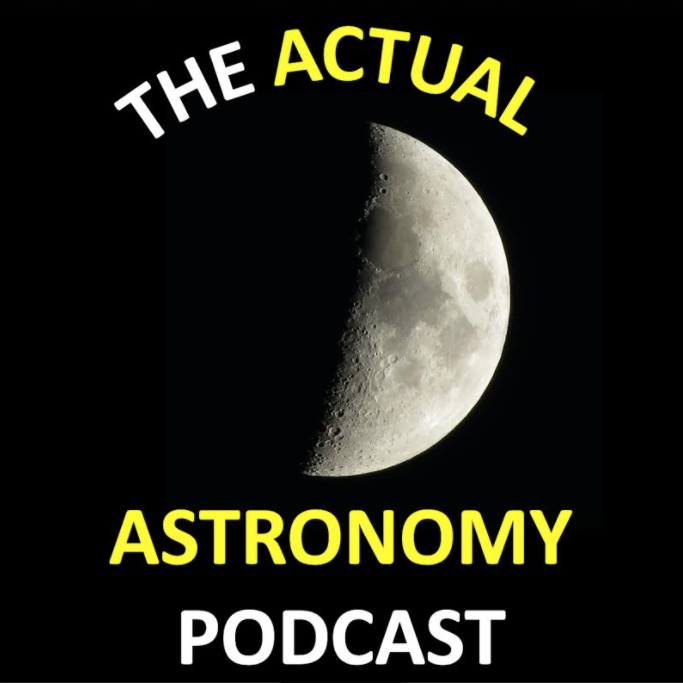Podcaster: Shane and Chris

Title: Actual Astronomy: A History of Planetary Motion
Organization: Actual Astronomy
Link : https://actualastronomy.podbean.com/ ; https://www.deepskyeye.com/
Description: The Actual Astronomy Podcast presents A History of Planetary Motion. In this episode we are joined again by Dave Chapman. Dave will review the history of our understanding of planetary motion, from prehistoric times and antiquity to the present day. He covers the contributions of Mesopotamians, The Greeks, Copernicus, Brahe, Kepler, Galileo, Newton, Halley, Lagrange, Laplace, Gauss, Le Verrier, Galle, Einstein, and Bretagnon. He concludes that our knowledge has progressed immensely, but in a way, we have come full circle!ects you can see when the sky is clear and dark.
Bio: Shane and Chris are amateur astronomers who enjoy teaching astronomy classes and performing outreach where they help the eyes of the public to telescope eyepieces.
Today’s sponsor: Big thanks to our Patreon supporters this month: Paul M. Sutter, Chris Nealen, Frank Frankovic, Frank Tippin, Jako Danar, Michael Freedman, Nik Whitehead, Rani Bush, Ron Diehl, Steven Emert, Brett Duane, Don Swartwout, Vladimir Bogdanov, Steven Kluth, Steve Nerlich, Phyllis Foster, Michael W, James K Wood, Katrina Ince, Cherry Wood.
Please consider sponsoring a day or two. Just click on the “Donate” button on the lower left side of this webpage, or contact us at signup@365daysofastronomy.org.
Please visit our Patreon page: https://www.patreon.com/365DaysOfAstronomy
or you can consider to sponsor a day of our podcast : https://cosmoquest.org/x/365daysofastronomy/product/sponsor-an-episode-of-365-days-of-astronomy/
Transcript:
A History of Planetary Motion with Dave Chapman on Episode 475 of the Actual Astronomy podcast. I’m Chris and joining me is Shane. We are amateur astronomers who love looking up at the night sky and this podcast is for everyone who enjoys going out under the stars.
Today we are welcoming back Dave Chapman, who has been a guest several times on the show, in particular, he curated The Stars You Should Know Series for us which were our most popular episodes. So if you want more about Dave or his content check those out.
Dave will review the history of our understanding of planetary motion, from prehistoric times
and antiquity to the present day. He covers the contributions of Mesopotamians, The Greeks, Copernicus, Brahe, Kepler, Galileo, Newton, Halley, Lagrange, Laplace, Gauss, Le Verrier, Galle, Einstein, and Bretagnon. He concludes that our knowledge has progressed immensely, but in a way, we have come full circle!
Welcome back to the show Dave!
This is the story of how humankind became aware of the planets of the Solar System and learned how they move in the sky.
Dave this podcast is based on an article you’ve written, can you tell us a bit about that?
Concluding Message: Please subscribe and share the show with other stargazers you know and send us show ideas, observations and questions to actualastronomy@gmail.com
365 Days of Astronomy
=====================
The 365 Days of Astronomy Podcast is produced by Planetary Science Institute. Audio post production by Richard Drumm, project management by Avivah Yamani, and hosting donated by libsyn.com. This content is released under a creative commons Attribution-NonCommercial 4.0 International license. Please share what you love but don’t sell what’s free.
This show is made possible thanks to the generous donations of people like you! Please consider supporting our show on Patreon.com/CosmoQuestX and get access to bonus content. Without your passion and contribution, we won’t be able to share the stories and inspire the worlds. We invite you to join our community of storytellers and share your voice with listeners worldwide.
As we wrap up today’s episode, we are looking forward to unravel more stories from the Universe. With every new discovery from ground-based and space-based observatories, and each milestone in space exploration, we come closer to understanding the cosmos and our place within it.
Until next time and let the stars guide your curiosity!

